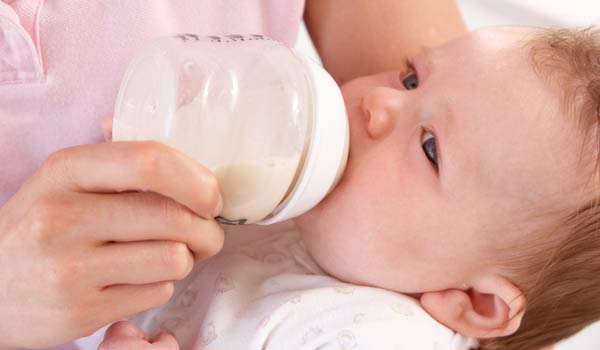Bottle Use at Age 2 May Make Kids Obese

Babies who continue to use a bottle into their early toddler years are at an increased risk for obesity later in life, according to a new study.
The results show children who drink from a bottle regularly when they are 2 years old are 30 percent more likely to be obese when they are 51/2 years old compared to children who do not use a bottle.
The results held true even after the researchers took into account factors that could influence the child's weight , including the mother's weight, the child's weight at birth and at 9 months and whether the child had been breast-fed .
The findings suggest weaning babies from a bottle by the time they are 1 year old may reduce a child's risk of obesity, the researchers said. The American Academy of Pediatrics recommends babies be weaned from a bottle by the time they are 15 months old.
"This is a behavior that parents want to be prepared to transition away from around the child's first birthday," said study researcher Rachel Gooze a doctoral student in public health at Temple University. Gooze notes that using a bottle after age one has been linked to other problems, including tooth decay.
The study will be published in an upcoming issue of the Journal of Pediatrics.
Bottle use and obesity
Sign up for the Live Science daily newsletter now
Get the world’s most fascinating discoveries delivered straight to your inbox.
Some previous studies have suggested a link between extended use of a bottle and obesity in children, but few have examined this link in kids that were followed for a long period of time.
The researchers examined information from 6,750 children who were born in 2001 and followed until they were 51/2 years old.
About 22 percent of the children were regular bottle users when they were 2 years old, meaning they primarily drank from a bottle and/or they were put to bed with a bottle.
Of these kids, 23 percent were obese by the time they were 51/2 years old compared with 16 percent of children who did not use a bottle.
The researchers note they could not account for some factors of the children's diet. For instance, they don't know whether children who used a bottle regularly when they were 2 years old were more likely to be overfed in general and whether the bottles contained sugar-laden drinks.
Weaning by 1 year
Extended use of a bottle may lead a child to consume excess calories, particularly if parents are using the bottle as a way to console their child rather than address his or her nutritional needs, the researchers say. At the age of two, a child is developmentally ready for solid food, and calories they get from a bottle are likely to be in excess of what they need, Gooze said.
We can assume that at age two, "the bottle is probably used for comfort or convenience rather than for nourishment or nutrients," Gooze said.
Such prolonged bottle use is common. More than 75 percent of infants in the United States drink from bottles beyond a year of age, according to a 2009 paper published in the journal Maternal and Child Nutrition.
"Advising parents to avoid using the bottle after the child's first birthday is unlikely to cause harm and may prevent obesity along with other health problems," the Temple University researchers said.
Pass it on: Weaning children from a bottle by the time they are 1 year old may decrease the risk of obesity, researchers say.
- When Breast-Feeding Fails: Why Moms Seek Out Alternatives
- 3 Simple Steps Can Cut Childhood Obesity
- Stress During Pregnancy Could Boost Child's Risk of Obesity
Follow MyHealthNewsDaily staff writer Rachael Rettner on Twitter @RachaelRettner.

Rachael is a Live Science contributor, and was a former channel editor and senior writer for Live Science between 2010 and 2022. She has a master's degree in journalism from New York University's Science, Health and Environmental Reporting Program. She also holds a B.S. in molecular biology and an M.S. in biology from the University of California, San Diego. Her work has appeared in Scienceline, The Washington Post and Scientific American.









